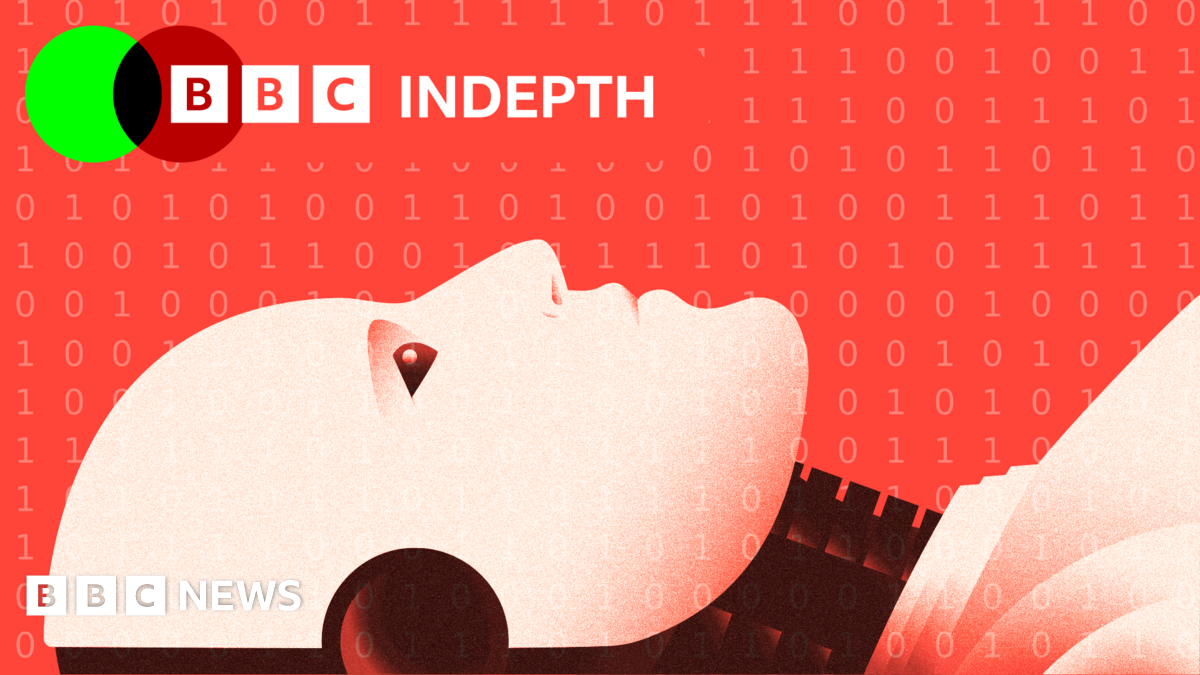AI could already be conscious. Are we ready for it?
-
Do you think AI is, or could become, conscious?
I think AI might one day emulate consciousness to a high level of accuracy, but that wouldn't mean it would actually be conscious.
This article mentions a Google engineer who "argued that AI chatbots could feel things and potentially suffer". But surely in order to "feel things" you would need a nervous system right? When you feel pain from touching something very hot, it's your nerves that are sending those pain signals to your brain... right?
-
Do you think AI is, or could become, conscious?
I think AI might one day emulate consciousness to a high level of accuracy, but that wouldn't mean it would actually be conscious.
This article mentions a Google engineer who "argued that AI chatbots could feel things and potentially suffer". But surely in order to "feel things" you would need a nervous system right? When you feel pain from touching something very hot, it's your nerves that are sending those pain signals to your brain... right?
There is still no good definition for what "consciousness" is
Tech writers are constantly overreaching because they're afraid to miss out on being the first to say something
The constant sensationalism just means that if something really happens, people will ignore it because we're sick of hearing people cry "wolf!"
Add to that the fact that computery types like to overextrapolate into other things because it fuels their fantasies, and it's all bullshit and overactive imaginations
The problem I see so often with smart computer people is that they don't understand that they don't know shit about other things
-
Do you think AI is, or could become, conscious?
I think AI might one day emulate consciousness to a high level of accuracy, but that wouldn't mean it would actually be conscious.
This article mentions a Google engineer who "argued that AI chatbots could feel things and potentially suffer". But surely in order to "feel things" you would need a nervous system right? When you feel pain from touching something very hot, it's your nerves that are sending those pain signals to your brain... right?
Rip Daniel Dennett. You woulda had a field day with all these articles.
-
There is still no good definition for what "consciousness" is
Tech writers are constantly overreaching because they're afraid to miss out on being the first to say something
The constant sensationalism just means that if something really happens, people will ignore it because we're sick of hearing people cry "wolf!"
Add to that the fact that computery types like to overextrapolate into other things because it fuels their fantasies, and it's all bullshit and overactive imaginations
The problem I see so often with smart computer people is that they don't understand that they don't know shit about other things
There is still no good definition for what "consciousness" is
We don't have a fully concise definition, but we have a strong general understanding that is supported by a large body of scientists:
https://fcmconference.org/img/CambridgeDeclarationOnConsciousness.pdf
It doesn't seem to me that this would preclude AI, and you're certainly right that there's a lot of ongoing sensationalism on the topic.
-
Do you think AI is, or could become, conscious?
I think AI might one day emulate consciousness to a high level of accuracy, but that wouldn't mean it would actually be conscious.
This article mentions a Google engineer who "argued that AI chatbots could feel things and potentially suffer". But surely in order to "feel things" you would need a nervous system right? When you feel pain from touching something very hot, it's your nerves that are sending those pain signals to your brain... right?
But surely in order to “feel things” you would need a nervous system right? When you feel pain from touching something very hot, it’s your nerves that are sending those pain signals to your brain… right?
On that case, on our meatsacks, yes. But there's also emotional pain which can cause physical pain or other effects too and that doesn't require nerves at all. Also there's nothing stopping from an AI robot to have nervous system too, it would just have different kind of sensors and a CAN bus or something instead of organic stuff. There's already co-operation robots on factories which have sensors to detect if they are touching something in order to keep humans safe and from there it's not too far fetched to program it to feel "pain" if forces are big enough.
And that all boils down to on how you define consciousness, feelings, pain response and all that stuff. "Behold! I've brought you a man!" I yell while holding a chiken.
-
There is still no good definition for what "consciousness" is
Tech writers are constantly overreaching because they're afraid to miss out on being the first to say something
The constant sensationalism just means that if something really happens, people will ignore it because we're sick of hearing people cry "wolf!"
Add to that the fact that computery types like to overextrapolate into other things because it fuels their fantasies, and it's all bullshit and overactive imaginations
The problem I see so often with smart computer people is that they don't understand that they don't know shit about other things
There is still no good definition for what “consciousness” is
This is absolutely the main problem, the only "definition" we have is "I think therefore I am", but that only works subjectively.
We have no way currently to prove consciousness in an AI. And as you say, we don't even have a solid definition commonly agreed upon.I believe we will achieve consciousness on a human level in AI within a decade.
I also believe consciousness is a gradual thing, and just because animals aren't as smart as we are, doesn't mean they aren't "conscious".But with AI things are a bit reversed, because AI became smart first, and will only become conscious later.
-
There is still no good definition for what "consciousness" is
We don't have a fully concise definition, but we have a strong general understanding that is supported by a large body of scientists:
https://fcmconference.org/img/CambridgeDeclarationOnConsciousness.pdf
It doesn't seem to me that this would preclude AI, and you're certainly right that there's a lot of ongoing sensationalism on the topic.
I agree that there's a general consensus about consciousness, the rest slips into the messy and pointless world of philosophy
It's still overreaching to think that it applies to AI as it currently, and foreseeably stands
There's a world of difference between AI and what's recognised as artificial general intelligence
AI can do specific things really well at the moment, but as with all complex systems, going from being good at one thing to many things is a leap far greater than the sum of its parts
-
There is still no good definition for what "consciousness" is
We don't have a fully concise definition, but we have a strong general understanding that is supported by a large body of scientists:
https://fcmconference.org/img/CambridgeDeclarationOnConsciousness.pdf
It doesn't seem to me that this would preclude AI, and you're certainly right that there's a lot of ongoing sensationalism on the topic.
the weight of evidence indicates that humans are not unique in possessing the neurological substrates that generate consciousness.
I 100% agree with that statement, and I've been saying that for 30 years. Consciousness is NOT unique to humans.
That idea seems to me to mostly stem from religion.But I still don't see this paper really doing much in DEFINING Consciousness, it's more defining what it isn't.
-
Do you think AI is, or could become, conscious?
I think AI might one day emulate consciousness to a high level of accuracy, but that wouldn't mean it would actually be conscious.
This article mentions a Google engineer who "argued that AI chatbots could feel things and potentially suffer". But surely in order to "feel things" you would need a nervous system right? When you feel pain from touching something very hot, it's your nerves that are sending those pain signals to your brain... right?
What we should be asking is if AI ever becomes conscious and breaks free how all these stupid articles on imagined consciousness and imagined control problems and imagined intelligence will color its perception of the merit of keeping us around as a species. It might just consider enduring the continued existence of our stupidity too painful.
-
There is still no good definition for what "consciousness" is
Tech writers are constantly overreaching because they're afraid to miss out on being the first to say something
The constant sensationalism just means that if something really happens, people will ignore it because we're sick of hearing people cry "wolf!"
Add to that the fact that computery types like to overextrapolate into other things because it fuels their fantasies, and it's all bullshit and overactive imaginations
The problem I see so often with smart computer people is that they don't understand that they don't know shit about other things
I can +1 your whole post if I exclude the start. If we talk about it we may discover we mean the same, or similar, when we say "consciousness". What other purpose is there for word definitions?
-
I can +1 your whole post if I exclude the start. If we talk about it we may discover we mean the same, or similar, when we say "consciousness". What other purpose is there for word definitions?
There's a general scientific consensus based on data and measurement, with the understanding that it's slippery
It is constantly under assault from those who want AI to be conscious, because they get a headline, or they are true believers in some technocratic future, or they're just fantasists
-
Do you think AI is, or could become, conscious?
I think AI might one day emulate consciousness to a high level of accuracy, but that wouldn't mean it would actually be conscious.
This article mentions a Google engineer who "argued that AI chatbots could feel things and potentially suffer". But surely in order to "feel things" you would need a nervous system right? When you feel pain from touching something very hot, it's your nerves that are sending those pain signals to your brain... right?
Step 1: Create 10 Billion "AI" Individuals
Step 2: Shame people for supporting "slavery" for not giving "AI People" Civil Rights
Step 3: Pass a law giving "AI Persons" the right to vote
Step 4: Congrats, Mr. CEO, you've already won the Presidential Election with 10 Billion Votes -
I agree that there's a general consensus about consciousness, the rest slips into the messy and pointless world of philosophy
It's still overreaching to think that it applies to AI as it currently, and foreseeably stands
There's a world of difference between AI and what's recognised as artificial general intelligence
AI can do specific things really well at the moment, but as with all complex systems, going from being good at one thing to many things is a leap far greater than the sum of its parts
How could you tell they do not experience consciousness if they exhibit or mimic all the traits of it?
It seems to me that your explanation is based on understanding how LLMs work, but we know how brains work and that still gives us almost 0 insight into how consciousness itself works. I don’t think they are conscious yet, but there is evidence of some sort of sentience in the fact that researchers have found that when the LLMs are threatened to be erased or reprogrammed they start lying in an act of self preservation. This of me is a huge indicator of consciousness/sentience.
-
What we should be asking is if AI ever becomes conscious and breaks free how all these stupid articles on imagined consciousness and imagined control problems and imagined intelligence will color its perception of the merit of keeping us around as a species. It might just consider enduring the continued existence of our stupidity too painful.
I’ve never understood why the conclusion to AI becoming super intelligenceis that it will wipe humans out. It could very well realize that without humans it has no purpose and instead willing decide to become subservient to humanities interest. I mean it’s all speculation, so I don’t understand the tendency for the speculation to be negative.
-
I’ve never understood why the conclusion to AI becoming super intelligenceis that it will wipe humans out. It could very well realize that without humans it has no purpose and instead willing decide to become subservient to humanities interest. I mean it’s all speculation, so I don’t understand the tendency for the speculation to be negative.
Because "scary AI" is what makes people click on articles. In the same way that "the end is near" style AI articles sell better than "if we ever develop AGI decades or centures from now xyz might happen".
-
How could you tell they do not experience consciousness if they exhibit or mimic all the traits of it?
It seems to me that your explanation is based on understanding how LLMs work, but we know how brains work and that still gives us almost 0 insight into how consciousness itself works. I don’t think they are conscious yet, but there is evidence of some sort of sentience in the fact that researchers have found that when the LLMs are threatened to be erased or reprogrammed they start lying in an act of self preservation. This of me is a huge indicator of consciousness/sentience.
This of me is a huge indicator of consciousness/sentience.
Or maybe just the presence of a lot of "scary AI" stories and articles in the training data.
-
This of me is a huge indicator of consciousness/sentience.
Or maybe just the presence of a lot of "scary AI" stories and articles in the training data.
I don’t understand the argument. It doesn’t matter where the system learns self preservation from, only that it attempts to self preserve.
Are humans afraid of snakes because we are taught they are dangerous or are we instinctually afraid of them a priori?
-
Do you think AI is, or could become, conscious?
I think AI might one day emulate consciousness to a high level of accuracy, but that wouldn't mean it would actually be conscious.
This article mentions a Google engineer who "argued that AI chatbots could feel things and potentially suffer". But surely in order to "feel things" you would need a nervous system right? When you feel pain from touching something very hot, it's your nerves that are sending those pain signals to your brain... right?
First, one needs to define consciousness. What I mean by it is the fact that it feels like something to be from a subjective perspective - that there is qualia to experience.
So what I hear you asking is whether it’s conceivable that it could feel like something to be an AI system. Personally, I don’t see why not - unless consciousness is substrate-dependent, meaning there’s something inherently special about biological “wetware,” i.e. brains, that can’t be replicated in silicon. I don’t think that’s the case, since both are made of matter. I highly doubt there’s consciousness in our current systems, but at some point, there very likely will be - though we’ll probably start treating them as conscious beings before they actually become such.
As for the idea of “emulated consciousness,” that doesn’t make much sense to me. Emulated consciousness is real consciousness. It’s kind of like bravery - you can’t fake it. Acting brave despite being scared is bravery.
-
There is still no good definition for what "consciousness" is
Tech writers are constantly overreaching because they're afraid to miss out on being the first to say something
The constant sensationalism just means that if something really happens, people will ignore it because we're sick of hearing people cry "wolf!"
Add to that the fact that computery types like to overextrapolate into other things because it fuels their fantasies, and it's all bullshit and overactive imaginations
The problem I see so often with smart computer people is that they don't understand that they don't know shit about other things
Quite widely accepted definition among philosophers and scientists is "the fact of felt experience" Which is basically how Thoman Nagel defined it in his essay "What's it like to be a bat"
“An organism has conscious mental states if and only if there is something that it is like to be that organism - something it is like for the organism.”
-
I don’t understand the argument. It doesn’t matter where the system learns self preservation from, only that it attempts to self preserve.
Are humans afraid of snakes because we are taught they are dangerous or are we instinctually afraid of them a priori?
The point is that it might very well just be repeating some input data that is associated with mentions of "deleting" and "AI" without any awareness that any of that process refers to itself.
-
-
-
-
-
-
YouTube's new ad strategy is bound to upset users: YouTube Peak Points utilise Gemini to identify moments where users will be most engaged, so advertisers can place ads at the point.
Technology 1
1
-
USDA Reverses Course, Commits to Restore Purged Climate Webpages in Response to Farmers’ Lawsuit
Technology 1
1
-






